Best Indoor Plants Names for a Harmonious Home According to Vastu Shastra
Incorporating plants into your home not only enhances its aesthetic appeal but also brings numerous benefits, including improved air quality and a sense of tranquillity. According to Vastu Shastra, the ancient Indian science of architecture and design, certain plants can attract positive energy, promote harmony, and boost well-being within your living space. This article explores the best Vastu plants for your home, providing insights into their unique properties and the specific benefits they offer. Whether you’re looking to rejuvenate your surroundings or align your home with Vastu principles, these plants will help create a balanced and harmonious environment.
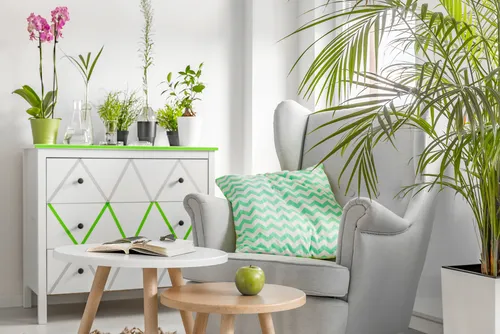
Benefits of Indoor Plants as per Vastu
As per Vastu, certain plants are considered auspicious as they remove negative energies and attract positive energies. Healthy plants, placed in the right direction, can attract abundance into your life. Vastu states that houseplants aid to maintain the flow and balance of energy in a household. They can also affect the health, affluence, and fortune of the inhabitants. On the other hand, if the plants are not compliant with Vastu, they can attract negative vibrations and bad luck.
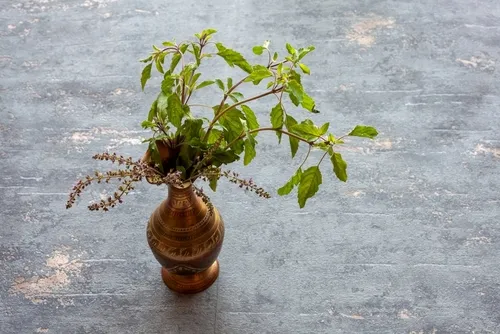
Here are the Vastu recommended indoor plants, which bring harmony, peace, prosperity, and health to homeowners.
15 Best Vastu Plants for Home
Discover the most beneficial plants for home according to Vastu Shastra.
Best Indoor Plants as per Vastu #1: Tulsi
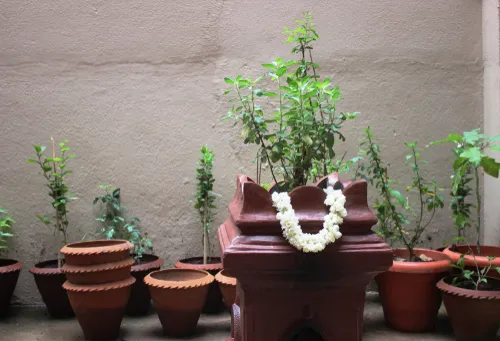
The tulsi plant is described as a form of goddess Lakshmi in the Vedas. The tulsi plant is auspicious for the financial, mental, and physical health of the family. Vastu suggests a tulsi plant at home brings harmony, happiness, and spirituality. Tulsi is also known as a mosquito repellent and has medicinal properties. The ideal place for the plant is in the east. You can also place it on the balcony or near the window in the north or the northeast. Ensure sufficient sunlight is available to the plant.
Best Indoor Plants as per Vastu #2: Lucky Bamboo
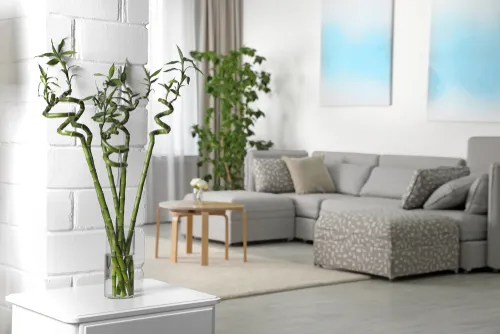
Bamboo plants are considered lucky according to Vastu Shastra and Feng Shui. Keeping bamboo plants at home leads to good luck, wealth, and fortune. The lucky bamboo plant attracts well-being when placed in the east. It invites money and wealth when placed in the southeast. Keep bamboo plants at the centre of the dining table to boost positive energy and attract abundance. A six-stalk plant attracts prosperity. A seven-stalk bamboo symbolises good health. An eight-stalk bamboo brings growth and prosperity.
Best Indoor Plants as per Vastu #3: Money Plant
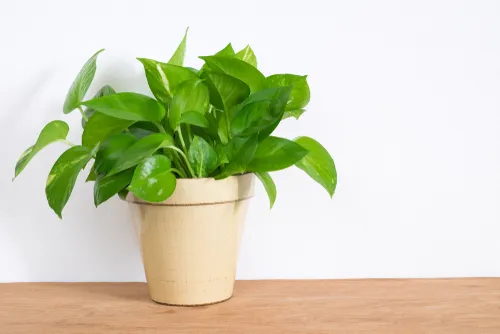
True to its name, the money plant is associated with wealth and prosperity. Money plants help remove obstacles in financial growth. It is believed that having a money plant at home brings good luck, happiness, and positive energy and protects against evil eyes. Vastu states that you should keep a money plant indoors in the southeast of the living room for positive energies as Ganesha is the god of the southeast. Avoid placing the money plant in the northeast. Ensure that the vines do not grow to spread their leaves on the floor. Use threads or climbers so that the plant grows vertically upwards. A dried money plant is the symbol of misfortune. Never keep it at home. Avoid placing your money plant near the kitchen.
Best Indoor Plants as per Vastu #4: Jade
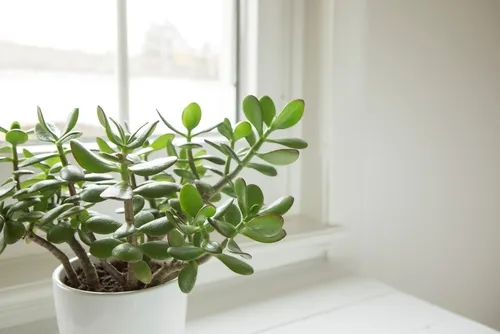
The jade plant is associated with positive energy, growth, and prosperity in Vastu Shastra and Feng Shui. East, southeast, west, and northwest are ideal directions to keep the jade plant. You can also keep this plant near the entrance to invite success and blessing. The dining room table, reflected in a mirror on the opposite side, is apt for a jade plant to bring abundance as the leaves resemble jade stones that symbolise wealth and prosperity. For good health keep a healthy jade plant in the east. Never keep the jade plant in a bathroom or bedroom.
Best Indoor Plants as per Vastu #5: Snake Plant
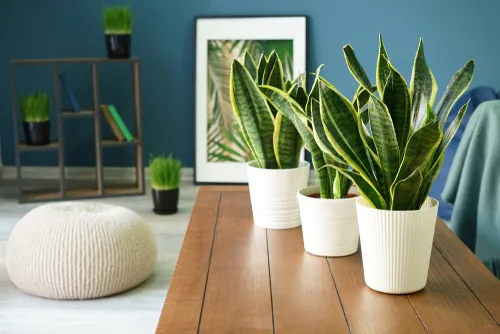
Snake plants spread positive energy and make an environment healthy by absorbing toxins and removing carbon dioxide. As per Vastu, keep the snake plant in the southeast. It aids in reducing stress and promoting a positive ambience. When placed near the window, it advances the oxygen stream and creates a calm ambience as it is regarded as one of the top air-purifying plants. As it releases oxygen in the night it is an ideal bedroom plant.
Best Indoor Plants as per Vastu #6: Peace Lily
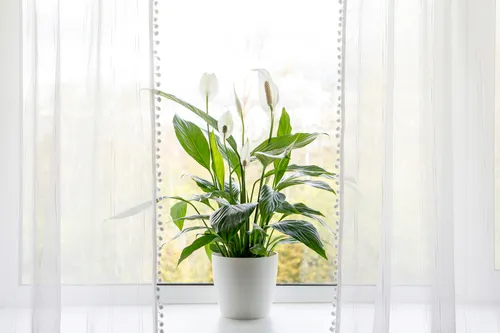
Peace lily, as per Vastu, is the symbol of love, peace, and harmony. It keeps away negative energy and attracts good vibes. It is an air-purifying plant that signifies hope and healing. The best place to keep this plant is near a bedroom window. Keeping it in the bedroom can aid peaceful sleeping and benefit those who have insomnia.
Best Indoor Plants as per Vastu #7: Rubber Plant
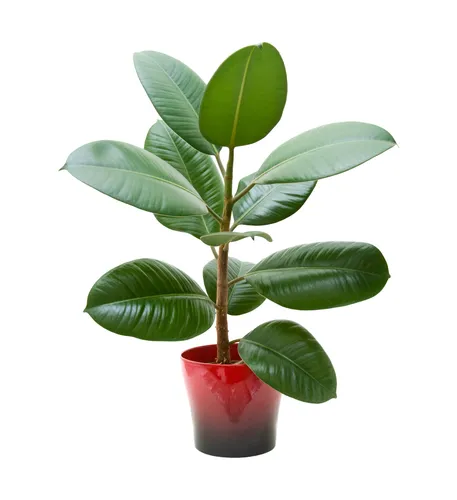
The rubber plant or rubber tree plant is one of the popular Vastu indoor plants. The rubber plant represents wealth and fortune even in Feng Shui, as its rounded leaves resemble coins. When placed in the home, it is believed to provide abundance. This plant removes toxins and improves the air quality. You must keep this plant in the southwest of the living room to get the best results.
Best Indoor Plants as per Vastu #8: Aloe Vera
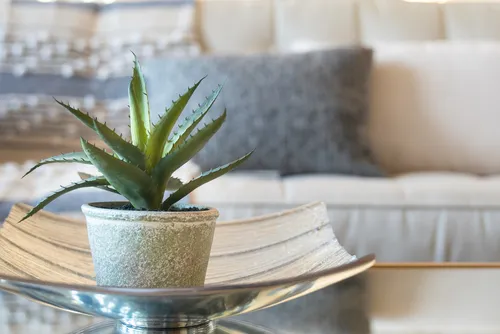
Aloe vera has been lauded for its healing and medicinal qualities. The aloe vera plant brings good luck and positive energy to homes. It is believed that the energy it releases can fight off bad vibes and bad fortune and add protective energies. Vastu suggests placing the aloe vera plant in the east or the north of the house. You can also place this plant within two to three feet of your computer to filter electromagnetic energies.
Best Indoor Plants as per Vastu #9: Areca Palm
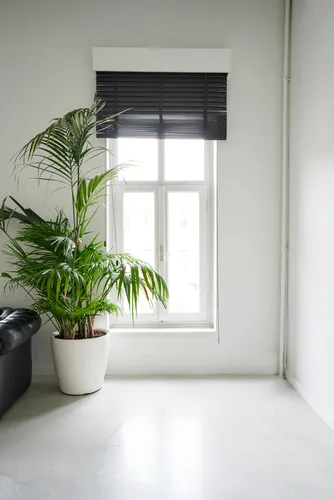
Areca palm attracts positive energy, neutralises negative energy, and brings prosperity, peace, and wealth into a home. The areca palm plant reduces air pollution, increases air humidity, and helps in overcoming dryness. According to Feng Shui, place it in the north, east, southeast, or south corners of the home.
Best Indoor Plants as per Vastu #10: Rose
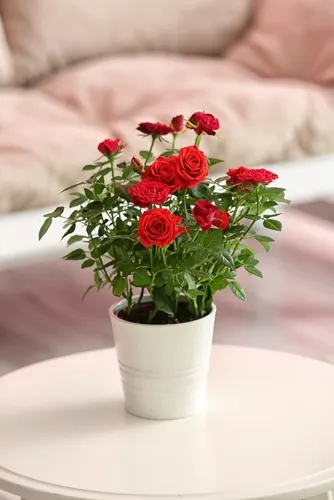
Blooming flowers bring feelings of vitality, improve mental health, lift the spirit, and bring happiness. The rose symbolises love and passion. It is also believed to attract healing and luck. Although Vastu Shastra forbids thorny plants like a cactus, the rose plant is an exception due to its numerous benefits. Rose should be grown in the southwest corner of the house.
Best Indoor Plants as per Vastu #11: Jasmine
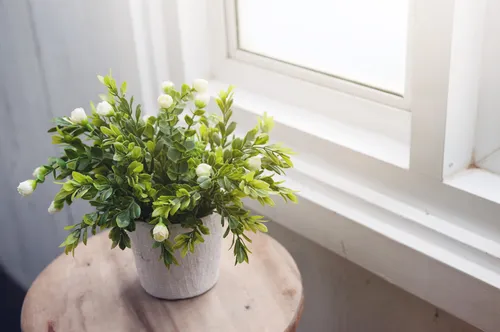
As per Vastu, the jasmine plant attracts positive energy and calms the nerves. The flowers are fragrant and bring positivity to the surroundings. It also helps maintain harmony in romantic relationships. It is the much-loved flower of Lord Vishnu and Lord Shiva. Jasmine is an effective Feng Shui houseplant that improves relationships. Place the plant near a south-facing window.
Best Indoor Plants as per Vastu #12: Chrysanthemum
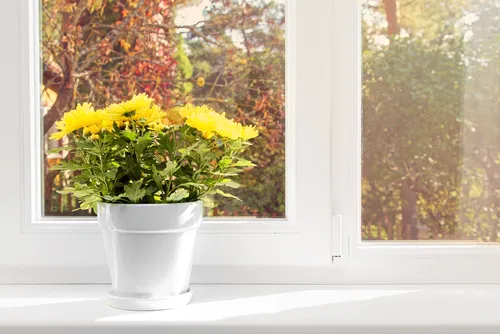
Chrysanthemum symbolises happiness, optimism, positive energy, and good luck. Buddhists use this flower for offerings on altars. Symbolic of powerful positive energy, this flower attracts good luck and well-being in the home. The chrysanthemum is best placed in the living room of the house, but never in the bedroom.
Best Indoor Plants as per Vastu #13: Lavender
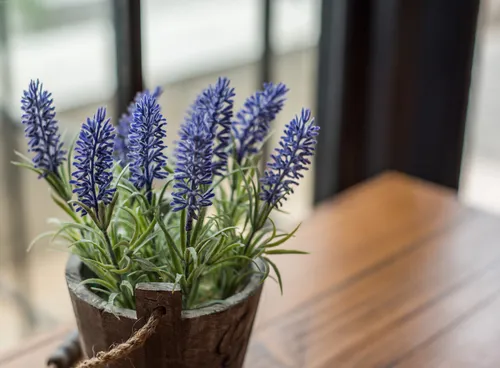
Lavender is notable for its aroma and therapeutic qualities. The lovely, floral fragrance that lavender flowers emit promotes good health, healing, happiness, and relaxation, as per Feng Shui. The colour purple also symbolises wealth and prosperity. This Vastu plant attracts inspirational tones and calms down frayed nerves. Keeping a lavender plant in the bedroom is suggested for improving marital happiness. Keep the lavender plant in the north, east, or northeast.
Best Indoor Plants as per Vastu #14: Daffodil
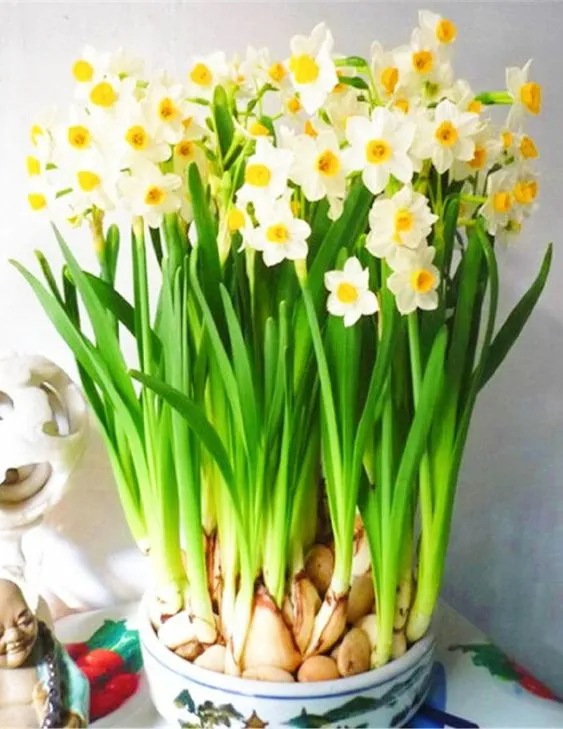
The daffodil flower ranks among the finest Vastu plants for home, representing virtues of faith, truth, and forgiveness according to Vastu Shastra. To harness its positive energies to the fullest, it is recommended to plant daffodils in the north or northeast direction of your house. This auspicious plant is believed to bestow good fortune and luck upon the household and its occupants. When selecting a daffodil plant, avoid the dwarfed variety, as it may lack the expansive positivity associated with its larger counterparts.
Best Indoor Plants as per Vastu #15: Orchids
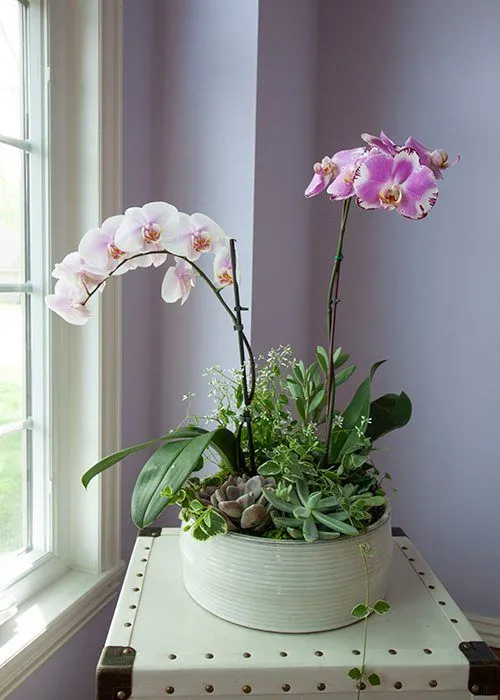
Orchids (Orchidaceae family) are esteemed symbols of success and abundance. Adding orchids as Vastu plants to your home can infuse your living space with positive vibes and symbolise the flourishing growth of your entire family. These exquisite flowers not only add elegance to your indoor decor but also radiate an aura of prosperity and well-being. Including orchids in your living environment aligns with Vastu principles, inviting good fortune and harmony into your home.
Best Vastu Trees for Home
If you are looking to plant some bigger trees instead of smaller plants, the following Vastu trees can enhance positivity, luck, and happiness.
Mango Tree
Known scientifically as Mangifera indica, the mango tree is celebrated for its positive influence. Planting it in the south, west, or southwest corners of your home is believed to bring progress and stability, enriching the environment with its vibrant presence.
Neem Tree
Renowned for its medicinal properties, the Neem tree promotes good health and positive energy. It is best planted in the northwest direction of your home to enhance overall well-being and happiness.
Coconut Tree
A member of the palm family, the coconut tree adds an exotic touch to any garden. According to Vastu Shastra, it should be planted in the west direction or south of your garden to foster stability and remove negativity, contributing to the home’s overall prosperity.
Vastu Plants to Avoid in Home
Introducing Vastu plants and trees into your home is a great way to enhance its ambiance and attract positive energy. However, according to Vastu Shastra, there are specific plants that should not be planted inside your home. Here are some examples:
Tamarind
Vastu suggests that tamarind trees can attract evil spirits or negative energy inside homes.
Acacia Arabica or Babool
Babool should always be planted outside the home as per Vastu Shastra. Planting it indoors can have a negative impact on relationships.
Date Palm
Keeping date palm trees inside the home is not advisable according to Vastu Shastra, as they are believed to bring poverty.
Cactus
Vastu advises against keeping cactus plants indoors as they are believed to emit negative energies. The sharp and prickly nature of cactus plants is associated with bringing misfortunes, stress, and anxiety.
Cotton Plant
Growing a cotton plant inside your house is discouraged. According to Vastu, it may invite unfavourable conditions and bad luck.
Bonsai
Keeping bonsai or artificially dwarfed plants inside the house is considered inauspicious according to Vastu Shastra. It is believed to hinder family growth and may even lead to health problems for family members. It is recommended to place bonsai in open spaces like a verandah.
Indoor Plants Vastu: Dos and Don’ts
- Always select healthy plants with vibrant foliage to bring good energy to your spaces.
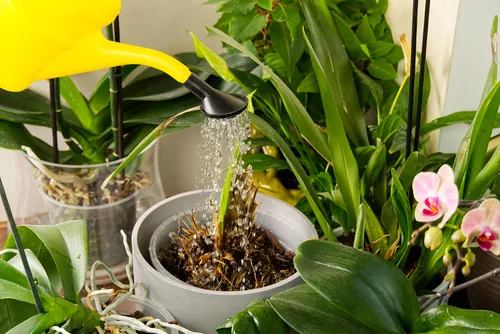
- Thorny plants, such as cactus, should not be kept at home. They attract negative energy, bad luck, and impact family bonding.
- Remove dry, wilted, or dead flowers and leaves regularly.
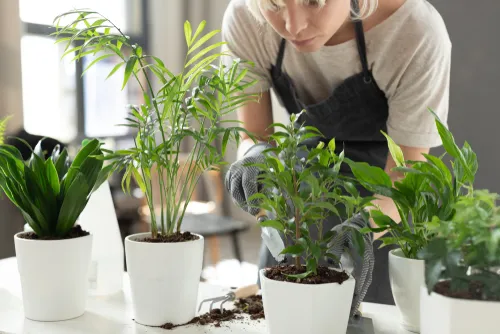
- Avoid using chipped or cracked pots.
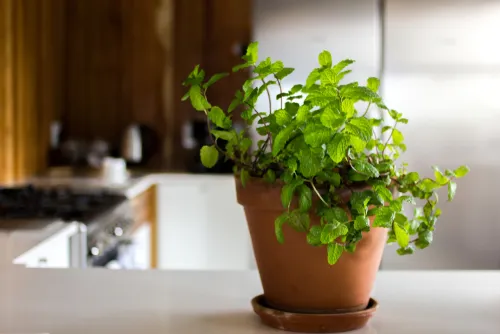
- Bonsai plants are believed to have stunted energy and lead to stagnation of wealth when placed indoors.
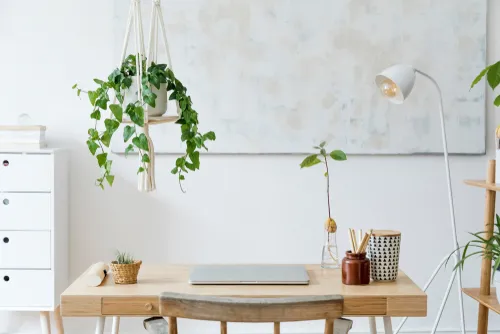
- Keep the leaves dust-free. Clean plants with a wet sponge regularly. If you have big plants, wash the leaves.
- While the best energy is obtained from potted plants, fresh-cut flowers in a vase can also clear the vibes of the rooms that have energy deficits.
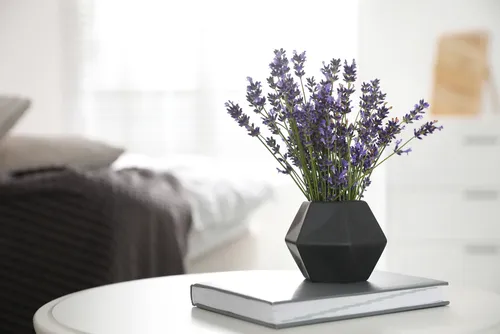
- Do not grow banyan or peepal indoors. According to Vastu, avoid growing big plants in the northeast of the house.
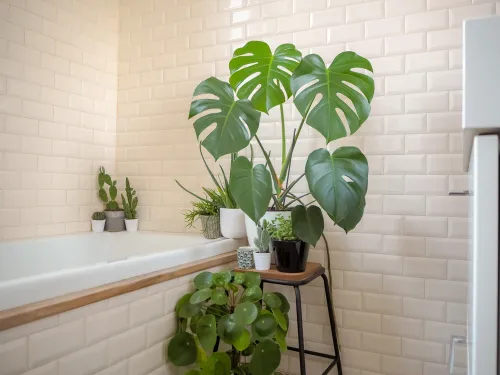
Vastu Plant Placement at Home: Significance of Directions
Here’s what you need to know about the importance of each direction when it comes to the placement of Vastu plants at home.
East (Most Auspicious)
The east direction symbolises new beginnings and growth, making it the most favourable spot for plants in Vastu. Plants like tulsi (holy basil), jade, and money plants are recommended for their associations with health and prosperity.
North (Suitable for Certain Plants)
Linked with the air element and Mercury, the north is ideal for flowering and colourful foliage plants. However, an excess of plants, especially large ones, may disrupt balance.
West (Limited Options)
Associated with the setting sun and Venus, the west is less suitable for most plants. However, drought-resistant plants like spider plants or certain cacti might be permissible.
South (Generally Discouraged)
Governed by Mars, the south is often avoided for plants due to its association with negative energy. Some suggest thorny or aloe vera plants for protection, but consultation with a Vastu expert is advised.
Northeast (Highly Beneficial)
This zone is optimal for spiritual growth and positive energy. Plants with spiritual or medicinal significance, such as tulsi or banana trees, are especially auspicious here.
Southeast (Highly Beneficial)
This direction, linked with the fire element and Venus, supports growth and prosperity. Plants such as money plants and jade plants, which symbolise success, are ideal here.
Northwest (Favourable)
Governed by the air element and Venus, the northwest is suitable for large, leafy plants with strong root systems. Neem trees and fragrant flowers like jasmine are particularly beneficial in this zone.
Southwest (Discouraged)
The southwest is associated with stability and the earth element. Planting here can disrupt this stability due to the constant growth of plants.
Placement Tips for Vastu Plants at Home
When incorporating Vastu plants into your home, it’s essential to follow specific guidelines for their placement:
- Avoid planting trees in the Northeast corner of your house.
- Be cautious when selecting plants that release sap, as they may not be suitable for Vastu purposes.
- Avoid planting large trees like banyan or peepal close to your home, as their deep roots can potentially damage the foundation.
- Ensure that the growth of large trees does not obstruct the morning sunlight.
- If you intend to plant coconut trees, do so in the Southwest direction of your house. Ensure that their shadows do not fall on your home.
- Avoid placing thorny plants inside your house, except for the rose plant, which is an exception to this rule.
- If you wish to plant a banana tree, it is advisable to do so in the Northeast zone of your house. This is believed to promote good health and positive energy within your home.
Conclusion
Incorporating Vastu plants into your home can significantly enhance its ambiance and promote positive energy flow. These plants not only serve as natural air purifiers but also symbolise various virtues and attributes that align with Vastu principles. From attracting wealth and prosperity to fostering love, harmony, and well-being, Vastu plants play a crucial role in creating a harmonious living environment. By carefully selecting and placing Vastu plants according to the guidelines provided, you can harness their beneficial energies to improve various aspects of your life.
Whether it’s the auspicious Tulsi plant bringing harmony and spirituality or the tranquil Peace Lily promoting love and healing, each plant carries its own unique significance. Furthermore, adhering to dos and don’ts outlined for indoor plants in Vastu ensures that your home remains filled with positive vibrations while avoiding any negative influences. Remember, the right selection and placement of Vastu plants can truly transform your home into a sanctuary of positivity and abundance, inviting blessings and good fortune into your life.
